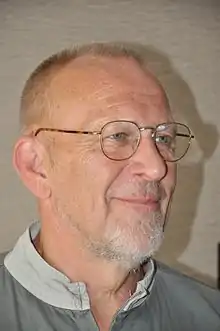Peter Michael Hamel
Peter Michael Hamel (born 15 July 1947 in Munich) is a German composer. His works have been associated with the minimalist style of composition, and in the late 1970s with the New Simplicity movement.

He is the son of the film director Peter Hamel. Hamel studied musical composition, psychology and sociology in Munich and Berlin with teachers including Günter Bialas and Carl Dahlhaus. He then continued his education abroad, spending several extensive periods in Asia (Fricke 2001).
In 1970, he founded "Between", an international group dedicated to improvisational music with whom he made 6 records on the intuition/WERGO label and in 1978 in Munich, he founded the Freies Musikzentrum, an institute for musical education and therapy. In 1978, his book Through Music to the Self (Hamel 1978) was published in English translation, obtaining wide circulation in Europe and the U.S.
Between 1997 and 2012, he was professor for composition at the Hochschule für Musik und Theater in Hamburg (Fricke 2001). His orchestral and chamber music is published by Schott, Bärenreiter and E.R.P./Celestial Harmonies. He composed four operas, many orchestral works (e.g., Gestalt), violin and piano concertos, sacred works for soprano, choirs and orchestra (e.g., Missa); Shoah (a radio-composition about the Holocaust), chamber-music compositions (including four string quartets). He is in demand as a performing artist (piano, prepared piano, pipe organ, voice and live-electronics). His First Symphony was premiered by Sergiu Celibidache in 1988; his Second Symphony had its first performance in Munich on April 29, 2008 with the Munich Philharmonic. In 2007 Hamel's Of the Sound of Life for pianist Roger Woodward was published by Celestial Harmonies. In 2009 parts of his music theatre "last minute" on Near Death Experiences has been premiered in Musica Viva Munich.
American minimalist composer Terry Riley has said:
...Peter's heart did not seem to be aligned alone with the post Webern traditions that had emerged so prevalently in Germany. His sensibilities were attracted more to American minimalism and Indian music and to some degree Rock and Jazz. In this sense he stands apart in the field of modern music of Germany. He has recognized the vast importance of improvisation and being "in the moment" in music performance. He realizes the importance of experimentation and of finding new ways to notate his ideas. However, his music is at the same time rooted in the great German tradition and today he is recognized as a major figure whose compositions have greatly enriched the development of 20th and 21st century repertoire.... (Riley 2007)
Discography
- Aura (1972)
- Hamel (1972)
- The Voice of Silence (1972)
- Buddhist Meditation East-West (1975)
- Nada (1977)
- Colours of Time (1980)
- Bardo (1981)
- Transition (1983)
- Organum (1986)
- Let It Play: Selected Pieces 1979-1983 (1987)
- Arrow of Time / The Cycle of Time (1991)
- Violinkonzert Diaphainon Gralbilder (1993)
- De Visione Dei (2001)
- Hamel: String Quartet No. 3, String Quartet No. 4, String Trio (2007)
See also
References
- Anon. n.d. "Peter Michael Hamel" (biography, German/English). Celestial Harmonies (accessed 14 September 2014).
- Fricke, Stefan. 2001. "Hamel, Peter Michael". The New Grove Dictionary of Music and Musicians, second edition, edited by Stanley Sadie and John Tyrrell. London: Macmillan Publishers.
- "Die betreffende Person ist nicht mehr am Haus". Musikhochschule Hamburg (accessed 13 December 2013).
- Hamel, Peter Michael, 1978. Through Music to the Self: How to Appreciate and Experience Music Anew, translated by Peter Lemesurier. Longmead, Shaftesbury: Element Books. ISBN 978-1852301361 (pbk).
- Riley, Terry. 2007. "A Few Thoughts on Composer PMH".
External links
- Official website (in English)